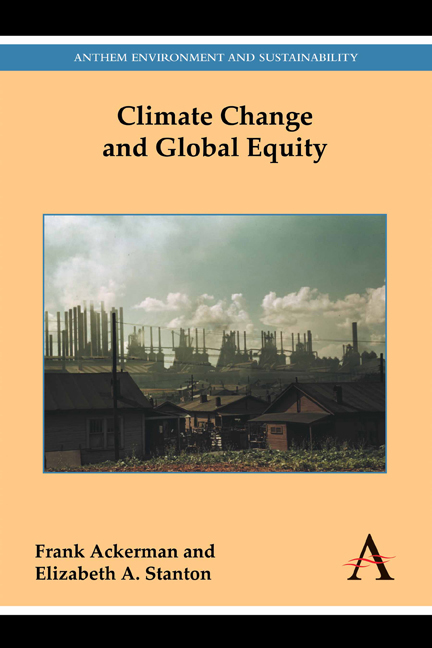Book contents
- Frontmatter
- Contents
- Introduction
- Publication History
- Part I Perspectives on Climate and Equity
- Part II Analyses of Climate Damages
- Part III Theory and Methods of Integrated Assessment
- Chapter 8 Inside the Integrated Assessment Models: Four Issues in Climate Economics
- Chapter 9 Limitations of Integrated Assessment Models of Climate Change
- Chapter 10 Negishi Welfare Weights in Integrated Assessment Models: The Mathematics of Global Inequality
- Part IV Applications of Integrated Assessment Models
- Appendix Supplementary Data for Chapter 3
- Notes
- References
Chapter 8 - Inside the Integrated Assessment Models: Four Issues in Climate Economics
from Part III - Theory and Methods of Integrated Assessment
Published online by Cambridge University Press: 03 November 2017
- Frontmatter
- Contents
- Introduction
- Publication History
- Part I Perspectives on Climate and Equity
- Part II Analyses of Climate Damages
- Part III Theory and Methods of Integrated Assessment
- Chapter 8 Inside the Integrated Assessment Models: Four Issues in Climate Economics
- Chapter 9 Limitations of Integrated Assessment Models of Climate Change
- Chapter 10 Negishi Welfare Weights in Integrated Assessment Models: The Mathematics of Global Inequality
- Part IV Applications of Integrated Assessment Models
- Appendix Supplementary Data for Chapter 3
- Notes
- References
Summary
Good climate policy requires the best possible understanding of how climatic change will impact human lives and livelihoods in both industrialized and developing counties. Our review of recent contributions to climate economics literature assesses 30 existing integrated assessment models in four key areas: the connection between model structure and the type of results produced; uncertainty in climate outcomes and projection of future damages; equity across time and space; and abatement costs and the endogeneity of technological change. Differences in treatment of these issues are substantial and directly affect model results and their implied policy prescriptions. Much can be learned about climate economics and modeling technique from the best practices in these areas; there is unfortunately no existing model that incorporates the best practices on all or most of the questions we examine.
Introduction
There is no shortage of models that join climate to economy with the goal of predicting the impacts of greenhouse gas emissions in the decades to come and offering policy advice on when, where and by how much to abate emissions. Some models are designed to offer a detailed portrayal of the climate, the process of economic growth or the feedback between these two systems; others focus on the long-run or the short-run, economic damages or environmental damages, carbon-based energy sectors or abatement technology. The best models produce results that inform and lend clarity to the climate policy debate. Some models surprisingly conclude – in direct contradiction to the urgency expressed in scientific literature – that rapid, comprehensive emissions abatement is both economically unsound and unnecessary. Some models seem to ignore (and implicitly endorse the continuation of) gross regional imbalances of both emissions and income.
Good climate policy requires the best possible understanding of how climatic change will impact human lives and livelihoods in industrialized countries and developing countries. No model gets it all right, but the current body of climate economics models and theories contains most of the ingredients for a credible model of climate and development in an unequal world.
- Type
- Chapter
- Information
- Climate Change and Global Equity , pp. 93 - 114Publisher: Anthem PressPrint publication year: 2014

